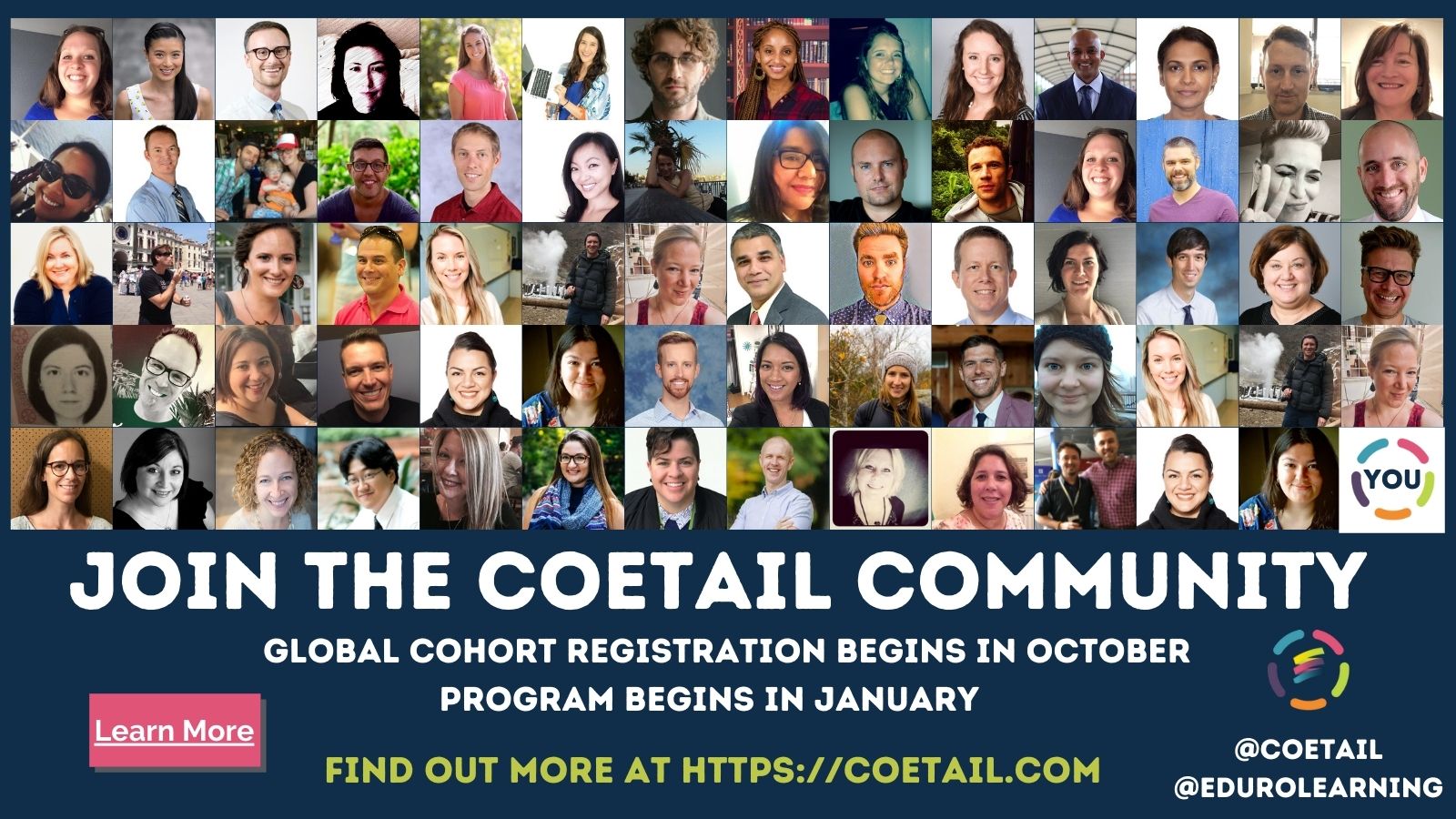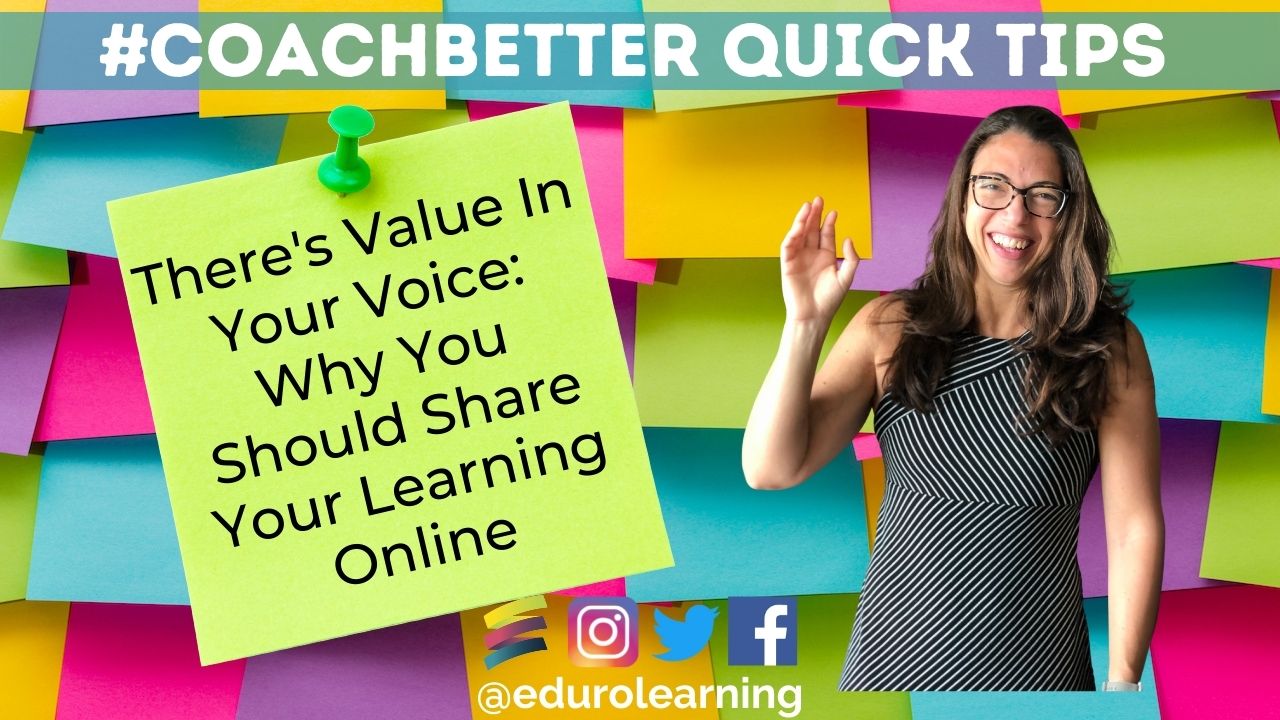Do you share your learning with others? On your team? Within your school?
What about in a broader community, using social tools like Twitter, LinkedIn, Instagram or a blog?
As educators we ask our students to reflect on and share their learning in lots of places – often times in spaces and ways that we aren’t yet sharing our learning.
Our students might have portfolios, or websites, or even be sharing their learning via video or other social media platforms.
But, have you tried doing that too? Do you know what it’s like? Or how it feels to put your voice “out there” for the world?
Educators often feel like they:
- really don’t have anything to share, or
- don’t think anyone would want to read their thinking, or
- their thinking isn’t valuable enough to share.
In reality, that couldn’t be further from the truth.
Today I’m sharing five reasons why sharing your learning online is super valuable for you particularly, but also for others.
This is something that I have learned time and time again, not only from blogging for myself, but also from facilitating COETAIL cohorts and from working with educators all around the world who are connecting and sharing in digital spaces.
At first, it can seem a little bit self promotional to be sharing your own thinking. But if you switch your mindset a little bit around to be more of a documentarian, a connector, or a reflector, you might see the potential of sharing your voice in digital spaces.
As I’m going through these five reasons, please keep in mind that sharing your thinking in a digital space can be whatever format works right for you, whatever feels comfortable for you, whatever space feels comfortable for you. The most important part is to be able to make that space that feels comfortable for you in sharing your learning.
5 Reasons Why Sharing Your Learning Online is So Valuable
1: To Consolidate Your Learning & Thinking
We have lots of thoughts that are rolling around in our brains and we don’t always pull together into consolidated and clearly articulated statements. Taking the time to actually do that helps not only solidify your own understanding and make it really concrete in your brain, but it helps you articulate your thinking for others. I know I think of my blog as like an external hard drive. When I take the time and energy to write a blog post I’m writing in a way that not only will it help me remember what I was thinking, what I was doing, why I was going through this process, what kind of impact it made. But I was also writing that post in a way that someone else could understand it. And when you are writing in a way that someone else can understand, that means you really understand what you’re trying to say.
By consolidating your own thinking and documenting it in a consistent place, you are not only making sure that you concretely understand what you’re talking about, but you’re articulating it for others as well.
2: Document Your Learning Over Time
When you can look back over years and years and years of professional growth, not only is that hugely powerful for you because:
- we so rarely stop and look back at the learning that we’ve done over time, and
- it also demonstrates your commitment to professional learning for things like potential future job hunts, maybe making a presentation somewhere, or
- maybe even you’re going to write a book based on all these blog posts you’ve accumulated over the years.
Taking the time to document your learning demonstrates a strong commitment to professional development, and it is the best archive of everything you’ve done and achieved over your professional career that you can just hand to a potential employer or someone looking for keynote speakers or potentially pull together for future publication.
One of the things that many educators that I work with in our private mentoring programs inside the Coach in COETAIL and Women Who Lead is that as soon as we achieve a goal, we’re ready to move on to the next one, and we kind of forget the great things we’ve already done. So if you don’t make space for documenting those things, it can feel like you’re always looking towards the next thing without having that moment of celebration and consolidation and documentation of the great work that you’ve already done.
That’s why in all of our professional learning experiences, including COETAIL, the Coach, and Women Who Lead all actually require you to document your growth over time so that you can look back and see how far you’ve come. When you think about going for an interview or getting ready to make a presentation, this is exactly the kind of resource that you need. And if you’ve been building it all along, you’ll have it right there at your fingertips.
3: To Model for Your Students
Your students are probably using lots of different social media tools, and they’re probably using them to socialize with each other, but they’re probably not using them for academic self-reflection documentation of their learning. This is a way to demonstrate for your students how you can use these tools in a more academic setting. It might not be something they want to pick up immediately for themselves, but if they see you being engaged and actively reflecting on your learning, that will help prioritize that kind of experience for them too.
We know in schools, particularly in IB schools, this idea of reflection can feel really burdensome because we’re asked to do it all the time. But if it’s something that you, as the teacher, are engaging in passionately and you see a reason and value in doing so that will help your students see that real life value as well.
4: To Make Connections & Build Your PLN
We all want to find other educators that are passionate and engage in the same things that we are, and the reality is that it’s a lot easier for them to get to know you if you have something that you have shared online for them to read or see or look at. As you’re building your personal learning network, if you are a complete blank slate it’s really hard for people to know if you’re a person they want to get to know.
By putting yourself out there, you’re sharing what you stand for, what you’re learning about, what you believe in, what you’re trying, what you’re doing in your classroom, who you are as an educator to make the connections that might help you, not only further your own educational career, but make the connections that you might need to help your students in their classroom.
Also, a side benefit of this is that there’s always someone who’s newer than you at a thing, so you might be initially thinking about sharing your learning in digital spaces to make connections with others – and others might be looking at the learning that you’re sharing as a way for them to connect with you!
5: To Find & Use Your Unique Voice in Digital Spaces
The way that you experience something, the way that you share something, the way you talk about things is unique. The idea might not be completely brand new, but your perspective and your experience, and the way that you talk about this particular thing is uniquely you. The way that you share things uniquely your way is going to resonate with some people. You’re going to find an audience who resonates with the way you write, the way you share and the perspective that you have, even if the actual content you’re sharing isn’t entirely brand new.
You should never feel this pressure to be sharing something new all the time. It’s actually the way that you’re sharing. And that helps you find the community that’s going to support you best and the community that you can actively engage in and be a part of as well.
Watch the Video
Build YOUR Personal Learning Network with COETAIL!
If this is something that resonates with you, you will love the COETAIL program.
The Certificate of Educational Technology & Information Literacy is a 5-course online certificate program designed for educators ready to embrace innovative, technology-rich learning. COETAIL will empower you to leverage the technology you have to transform your practice in order to positively impact learning for all students.
In COETAIL you will find your voice by blogging each week, and having a global community to support you in the process! Once you get comfortable in those spaces yourself, you’ll uncover all sorts of opportunities to engage your student in authentically sharing their learning too!

COETAIL embraces a community approach to learning through annual global cohorts that connect you with engaged educators, and supportive facilitators, around the world. Graduates of COETAIL are confident, adaptable, connected educators ready to tackle any new challenge that comes their way!
All educators are welcome: classroom teachers, coaches, specialists, school leaders. The program is customizable for educators in any setting. COETAIL is for educators who are ready to transform their practice through innovative pedagogical practices, and committed to a 1.5 year professional learning experience in a global cohort.
Registration for our next global cohort opens on the 18th of October and closes on the 14th of November. We facilitate only one cohort each year, so we can create connected, collaborative and community driven global cohorts. Now is your chance to be part of a global movement to transform learning for all students in your school community!
Find out more: https://coetail.com/

Recent Comments